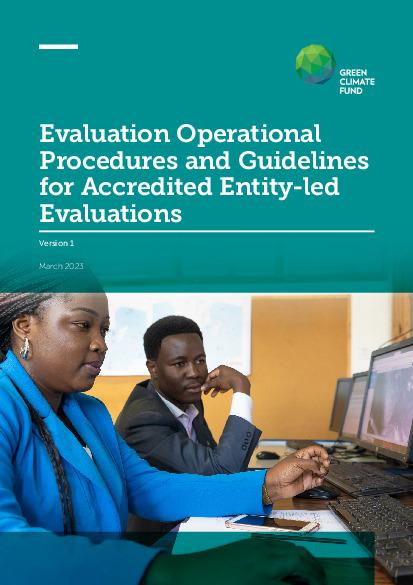Evaluation policy for the GCF
The Evaluation Policy for the GCF is a GCF-wide policy that defines the overall approach of GCF evaluations, including principles, criteria, and objectives. It sets out the policy to assess the results, performance, efficiency and effectiveness of the GCF in delivering its mandate. The Policy is adopted by the Board and further designates the roles, responsibilities and accountabilities of the GCF Secretariat, the Independent Evaluation Unit (IEU), other independent units, accredited entities working with the GCF and other stakeholders.
GCF Secretariat’s role in evaluations
The Secretariat is responsible for building a corporate culture that fosters learning and incorporates evaluation findings and recommendations into its decision-making at various levels of organisational and operational management. The Secretariat ensures that GCF projects and programmes have adequate resources devoted to undertaking evaluations during approval. It manages, commissions and supports evaluations/reviews/assessments of programmes, strategies, processes and policies and of selected GCF investments in accordance with the Board-approved work plan.
The Secretariat is also responsible for receiving, reviewing, and assuring the quality of interim and final evaluations submitted to GCF by the AEs in line with the MAF. The findings and lessons learned from evaluations will be synthesised and disseminated to inform the Board, the Secretariat and other GCF stakeholders. The Secretariat has been mandated to build the capacity of AEs and in that respect, an evaluation operational guidelines and procedures has been developed to be used by AEs in undertaking these evaluations. In addition the secretariat will play an important role in evaluations led by IEU. While providing the relevant inputs to IEU on IEU led evaluations, the secretariat will also receive evaluations undertaken by the IEU and prepare management responses for GCF’s Board.
GCF evaluation operational procedures and guidelines for Accredited Entity-led evaluations
These Evaluation Operational Procedures and Guidelines (‘Guidelines’) aim to promote a shared understanding of the requirements of the GCF Evaluation Policy as they relate to the delivery of interim evaluations and final evaluations of funded activities. These Guidelines map out what is required and recommended at each stage of an Accredited Entities-led evaluation from planning right through to submission to the GCF to deliver a robust evaluation. They offer a guide for Accredited Entities and other stakeholders when delivering on their evaluation-related roles and responsibilities at various stages of the GCF’s Programming Cycle. The Accredited Entities are strongly encouraged to use these Guidelines when evaluating all funded activities including public sector and private sector adaptation, mitigation, or cross-cutting projects/ programmes that are funded by GCF.

Evaluation operational procedures and guidelines for Accredited Entity-led evaluations
05 Apr 2023
These Evaluation Operational Procedures and Guidelines (‘Guidelines’) aim to promote a shared understanding of the requirements of the GCF Evaluation Policy as they relate to the delivery of interim evaluations and final evaluations of funded activities. They should be read alongside the Monitoring and Accountability Framework, GCF Evaluation Policy, GCF Evaluation Standards and the Integrated Results Management Framework.
GCF evaluation standards
The GCF Board mandated the IEU to develop evaluation standards in collaboration with the GCF Secretariat in order to inform the Fund’s overall results, successes and unintended consequences in a credible and measurable manner. By applying these standards, the Fund intends for a more consistent and harmonised approach across all three types of evaluations, namely, IEU-led, Secretariat-led and AE-led, as recognised by the GCF Evaluation Policy. As a result, 15 GCF Evaluation Standards were developed with the objective to support and enable the production of state-of-the- art evaluations with high-quality evidence and recommendations.
